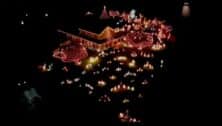Chester County Leadership — Michael Hall, Kennett Symphony’s Maestro
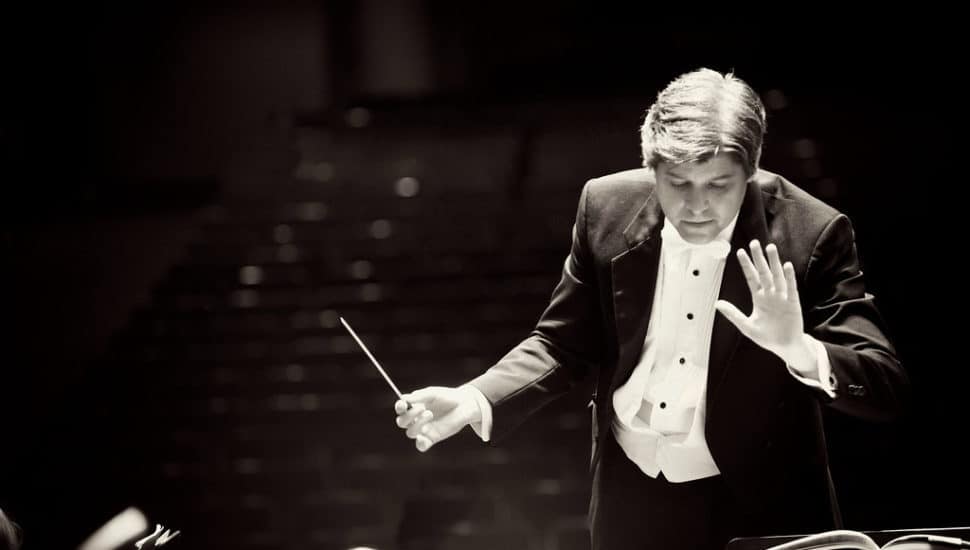
Coductors are, by definition, animated people. But watching Mr. Hall conduct the Kennett Symphony feels like you’re watching a man set more than just the tempo of the music. There’s something else going on. He moves silently in front of the symphony, thrashing at them with the baton one moment and leading them gently into an interlude the next. He’s guiding his players to a place you cannot see, but if the magic is working you may be able to feel it: the wrenching crescendo or the cello solo that pulls you deep inside yourself.
Well before the first intermission, Mr. Hall is sweaty and breathless when he addresses the audience. This is what he lives for.
A Canadian by birth, Mr. Hall completed undergraduate studies at the University of Toronto before training with Gustav Meier at the University of Michigan. He finished his masters there, jumped the pond and continued at the Royal Academy in London with Sir Collin Davis, conductor of the London Symphony Orchestra. That’s an incredible resume. The film school equivalent would be like going from Stanley Kubrick to Steven Spielberg.
His first professional position was with Winnipeg Symphony in Canada. He conducted rehearsals and understudied, filling in from time to time.
Hall eventually left wintry Canada for sunny San Diego and the Pacific Symphony, filling a position with that symphony similar to the assistant one he held in Winnipeg. He remained in San Diego for six years, all the while intermittently accepting invitations to guest conduct all over the world: Spain, London, Berlin, etc.
But he was back in San Diego when word reached him that he had been chosen to audition with the Kennett Symphony for Music Director. Of the 160 that applied, only Mr. Hall and two others received invitations.
Chester County’s effect on him was immediate. Mr. Hall fell richly in love with the county as he toured Longwood Gardens; met with community leaders, and acquainted himself with seasoned ticket holders. He says it was a comfortable courtship, owing largely to the quality of musicianship in the symphony. They were first rate players. Rehearsals went smoothly.
On the last evening of his public audition, Hall closed with a fearsome rendition of Dvořák’s ‘Symphony No. 9 in E Minor from the New World’ — one of the boldest compositions in all of classical music — a signal to any skeptics that Mr. Hall was, indeed, a serious conductor.
When the season ended, the baton was his.
I was lucky enough to speak with Mr. Hall on the eve of Kennett Symphony’s 75th season. We talked about his life, work, and love: music.
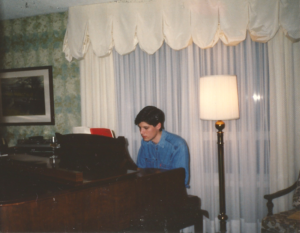
VISTA Today: Was music an important part of your childhood, Michael?
Michael Hall: My father was an avid music lover. He didn’t play an instrument, but he enjoyed classical music. Some of my earliest recollections are of sitting with him and listening to classical recordings. Often times when you’re very young you sort of emulate your parents, and his example allowed me to have an open mind to a different kind of music from a very young age.
Then it wasn’t long before you began learning an instrument.
Yes, I played the piano.
When did you begin thinking about conducting?
When I was in High School my piano teacher, knowing me and how I played, suggested that conducting might be something I would enjoy. At the time, I had never quite thought about it, so I explored the possibilities. In college, I began conducting small ensembles, community orchestras, and my church choir. What I discovered was that I found the experience of being in front of a group of musicians thrilling. I had the bug, so to speak.
What is the effect a conductor has on his orchestra exactly?
I think of it in two ways. One, you are there in a very practical sense. Through gestures, the conductor conveys the tempo of the piece. You also give cues to musicians to let them know when to begin a solo, for example.
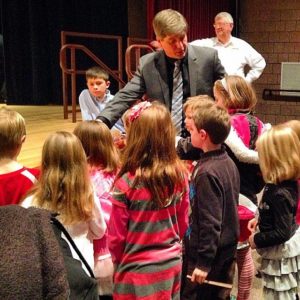
And then there’s the less practical, where the real artistry comes in.
Exactly, as a conductor, you also have a responsibility to show the players how to play. Your gestures can express certain articulations that the musicians respond to. You can show them, in essence, how you want a melody to sound, whether it’s louder or softer or smooth, for example. You are encouraging them and helping them and inspiring them to create these great melodies and harmonies and music that comes off the page. You’re almost, you know, focusing their musical energies into one idea and pushing it toward one place. When the energy works — when the musical relationship is great between the conductor and the orchestra — it’s magical.
It’s almost like a dance, isn’t it?
In a certain sense, that’s quite right. Conducting is gestural, there’s a very rhythmic component that the musicians are trained to respond to. But It’s certainly not choreographed to any extent. For me, my mind is very focused on the music and what I would like to hear. How can I communicate my sense of how the music should sound at any given moment? In a way, I’m dancing with my own perception of the composition, not necessarily with the musicians.
It sounds like an enormously difficult thing to learn how to do.
It isn’t easy! (Laughing) When you study conducting there are certain basic gestures that every conductor learns, certain patterns we all learn that stay the same. That’s sort of at the beginning. From there, hopefully, you develop a more natural way of communicating your sense of the music. Slowly, you learn to use your face, your eyes, and eventually every part of yourself to communicate with the musicians. That’s the part that cannot be taught. There’s a spontaneity to it and a conviction. I think if you’re very convinced of what you want, musically speaking, and you have the technical elements down then it becomes very organic.
As you get further into your career, do find yourself less aware of those technical elements while performing?
That’s what you strive for as a conductor, what you spend your whole career reaching toward. In the beginning, you’re very conscious of your gestures and the very technical elements. As a conductor, I play the orchestra, but it’s similar, in a way, to the experience of learning an instrument. The great instrumentalists get to the ability where they’re no longer really thinking of playing an instrument in any sense. They transcend that, and at that point what you’re talking about is pure musical communication. That’s when the real expression comes through; a melody that is so heart-wrenching, or a moment that is so full of pathos or full of anger or whatever the case may be. That’s the goal. We’re all trying to come out of ourselves.
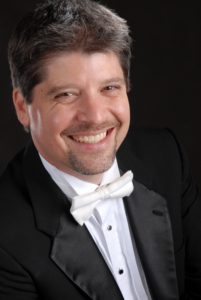 And it really can be so powerful.
And it really can be so powerful.
Yes, certainly! Great classical music is an insight into how life is and how we feel; the human condition. As musicians, we all want to come together to express that in the clearest and most exciting way we can. To be able to recreate, in a sense, this fantastic work of art, to live in that world for a little while is really exciting. That’s why we do it.
Yet there’s a tendency in our culture to see classical music as something reserved for a very specific group of people.
We try to remind people that this music is earthy, it’s natural, and it’s powerful. I think that some people get a sense that it’s all very rarefied music or “mind music”. This is music that’s empowering and rough, and it’s expressiveness survives because it was written by real people who lived real lives. But because we’re separated from some of this music by hundreds of years we don’t necessarily think about that right away. It’s not something that’s regularly apparent, but it certainly was to the audience of the time. And we want people to experience it with us, to come away from the concert feeling great and also that maybe we affected their soul, their heart a little bit.
Earthy and powerful. That just reminded me of Stravinsky’s ‘The Rite of Spring’. To think that the audience could be moved to violence and rioting after hearing it, not to mention that it was a ballet.
And ‘The Rite of Spring’ was such a unique event, nothing like it had ever been written before. I mean, nothing even close to it had been heard before. And so you listen to it for the first time and you don’t know what to make of it — it’s so compelling and not really understandable in a sense. It’s shocking, and in some ways it’s a bit scary. We’ve lived with the piece for over a hundred years now and it still has that quality to it, that unmistakable shockingness. That’s again the element of why this music, orchestral music or concert music, is so wonderful. It expresses so many different emotions. All the emotions.
How important is it for you before a performance to speak about the history of the composer and the work?
I’d say it’s very important. If we were to perform a Beethoven symphony, for example, part of the study process for me as a conductor is to learn about the piece itself as much as I can — why it was written and what the composer was trying to convey or accomplish. I want to provide as much context as possible for the audience. I think if I can share some of that knowledge — shed a little light on the piece, blow some of the dust off of it, so it speak — I think that helps audiences appreciate what we’re doing a little more.
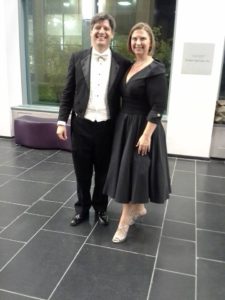 Will Kennett Symphony be performing Beethoven soon?
Will Kennett Symphony be performing Beethoven soon?
Next season we’re performing Beethoven’s ‘Fifth Symphony’ in the Longwood Gardens Exhibition Hall. The Fifth is the great “da da da dummm”. It’s fate knocking on the door, as it were. This symphony is a struggle from darkness to light. And that will be very exciting because it’s an extraordinary venue in which to experience this kind of music. The acoustics are fantastic, and the audience will be quite up close and personal with the orchestra.
Tell me about opening night this year.
This weekend is Opening Night celebrating our 75th Anniversary season. We have commissioned a young up and coming composer, Anthony Constantino, currently at the Manhattan School of Music, who has written a piece, especially for us, to celebrate the occasion. It is called ‘Amidst All Our Brilliance’ and is a piece full of energy and jubilation. We are welcoming a brilliant, young cellist from Curtis, Timotheos Petrin, who will perform the Saint-Saëns Cello Concerto. Also on the program is Puccini’s elegy I Crisantemi and the epic Pines of Rome for a thrilling grand finale. A historical exhibit will be on display, and we will usher in the evening at 6:15 pm as special guests reflect on the history of the Kennett Symphony. We will conclude the evening with a post-concert reception for all.*
Finally, what is the best piece of advice you’ve ever received?
With all the teachers you have, all the people you meet in the music world everybody impresses a little on you — especially when you are a student. But when I was still in school I was going through a tough time. Conducting is a competitive profession and a very difficult one and, at the time, I wasn’t sure I was going to be able to make it.
Then a conductor, Mark Wigglesworth, came to the Royal Academy to present a master class. His conviction, the way he lived totally for the music; this is what he did, all he did, and all he wanted to do really. That completely inspired me. Just through the power of his example, it reminded me in a very strong way why I decided to do this in the first place. He was a kindred spirit. The power of music, the way he approached it, how he loved totally for it — he was the whole package. I thought: this is it. Someone is doing exactly what I want to do in a way that is authentic and real and desperate, and that’s exactly how I’m going to be.
___________
*Opening night for the Kennett Symphony’s 75th Season was Saturday October 17.
Connect With Your Community
Subscribe to stay informed!
"*" indicates required fields








































![95000-1023_ACJ_BannerAd[1]](https://vista.today/wp-content/uploads/2023/03/95000-1023_ACJ_BannerAd1.jpg)








